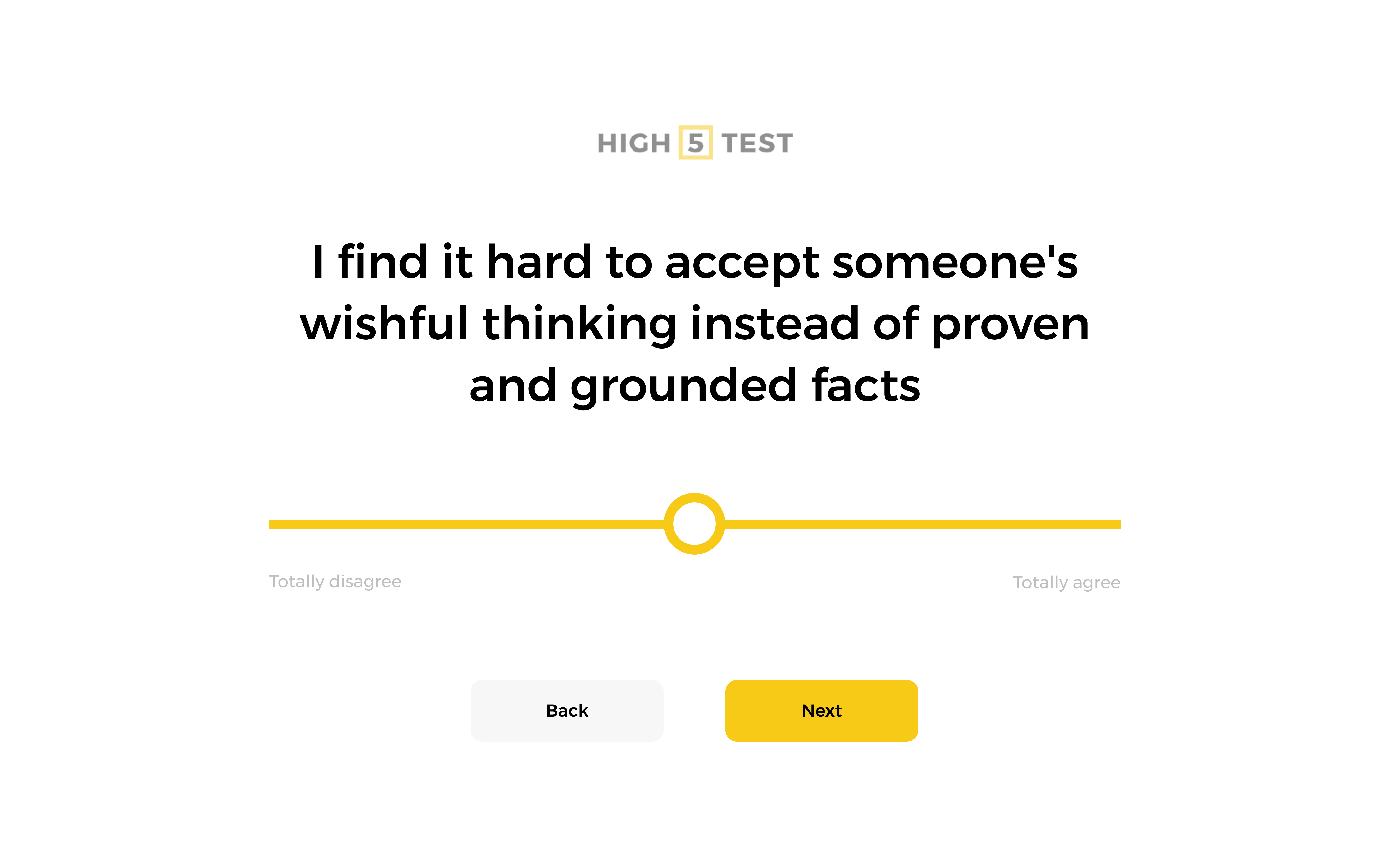Identifying your unique strengths is the first step toward personal growth and reaching your full potential. The HIGH5 Strengths Test provides a comprehensive assessment of your positive character traits, shedding light on the qualities that truly define who you are. Are you kind, self-confident, brave, or productive? Discover your core strengths and how to leverage them for success with the HIGH5 Test.
There are a number of ways that we humans demonstrate strengths – whether they are expressed as our character, talents, abilities, interests, skills, or competency (1). These positive traits can help us to thrive in whatever we do. Each person will have their own unique blend of skills, qualities and attributes – whether it’s assertiveness, independence, reliability, or adaptive problem-solving manner, if an individual is aware of their traits and strengths they can help us pursue our dreams and live a life of fulfillment and authenticity (1,2). However, we also have some negative character traits that are also part of our personality. But the most interesting thing about your character is that it’s not constant.
It’s important to define the distinction between character and personality, as sometimes the terms can be used interchangeably, although they are different things. Your character, or character traits are individual values and beliefs which can influence our personality. However they are not fixed, and our life experiences can shape or reveal our intrinsic qualities (3). This differs from personality or personality traits which is our innate temperament and is something we are typically born with or is relatively fixed or slower to adapt and change (3).
So when it comes to strength of character, as you gain new experiences, your character traits can change. And if you are self-aware, you can help shape and choose what kind of person you’d like to become. By finding out the meaning of positive qualities and taking a look at the examples of positive character traits, you’ll become more aware of the traits you want to work towards or demonstrate consistently. In this article, we’ll define the meaning of positive character traits and introduce examples of positive traits, attributes, and skills separately for students, kids, and the workplace. In the end, we’ll also review the most common negative character traits.
What are positive character traits and qualities?
Positive character traits are personal attributes or strengths that reflect our positive thought patterns, feelings, and behaviors (1). While people possess both positive and negative qualities, focusing on your innate strengths can be a powerful catalyst for growth. The HIGH5 Strengths Test provides an in-depth analysis of your unique strengths, enabling you to understand and amplify the positive qualities that you can use to help drive your success.
The American Psychological Association (APA), defines personality traits as stable, enduring internal attributes “inferred from a pattern of behaviors, attitudes, feelings, and habits in the individual” (4). While personality traits are neutral characteristics of an individual, positive character traits help us develop an optimistic attitude toward ourselves. This, in turn, leads to a high level of self-esteem and confidence (4).
Understanding your own positive character traits is useful to explain your thoughts, predict your future behavior and focus on your strengths to grow either personally or professionally (1).

For example, knowing you’re an introvert may help you focus on your social skills and develop them to feel more natural while interacting with other people. Although many people believe that positive qualities are stable, the latest studies prove that personality may change over time (3, 4). Respectively, by focusing on your growth, you can develop positive qualities and become more energetic, kind, optimistic, or generous.
Take a look at this three-step process if you want to develop positive character traits:
- Identify personality traits you don’t like in yourself or are causing issues in your life. For example, you may get angry too easily, you may judge people for no reason, or behave too shy in some situations.
- Choose one specific positive trait that you want to develop. Take a look at the various positive character traits below and see which one you want to focus on.
- Be aware of your thoughts and actions during the day to monitor how closely you are aligning with (or deviating from) your target traits.
Pro Tip From HIGH5
Embrace a growth mindset by continuously seeking opportunities to develop your strengths further. Regularly revisit your HIGH5 results to track your progress and identify areas where you can stretch beyond your current capabilities while staying true to your innate strengths.
Benefits of having positive character traits
Positive character traits and qualities are essential aspects of our personalities that help us navigate life successfully. These attributes shape our interactions, drive personal growth, and contribute to our overall well-being (1).
Enhancing relationships
Enhancing relationships is all about warmth, friendliness, and honesty. When you’re genuinely kind and affectionate (particular character traits we will discuss shortly), you make others feel welcome and valued. Being approachable and sociable helps you form positive relationships, while truthfulness builds trust and transparency in your interactions. Dependability is crucial too; when others can count on you it strengthens bonds. Showing consideration and honor towards others fosters positive social experiences, making relationships even stronger (5).
Driving personal growth
When it comes to driving personal growth, curiosity, persistence, and self-discipline are key. A strong desire to learn and explore drives continuous knowledge acquisition. Staying committed despite obstacles helps you achieve long-term goals, and maintaining focus and control over your actions leads to better outcomes. Being open-minded and receptive to new ideas encourages adaptability and innovation, keeping you on the path of constant evolution (1).
Contributing to overall well-being
Contributing to your overall well-being involves maintaining optimism, cleanliness, patience, and internal peace or a sense of relaxation. Keeping a positive outlook improves your mental health and happiness. Good hygiene and a healthy lifestyle promote physical well-being. Handling delays and difficulties calmly reduces stress and promotes emotional stability. Staying calm helps you manage stress and maintain tranquility, which is essential for a balanced life (1).
Achieving success and fulfillment
Achieving success and fulfillment often involves ambition, decisiveness, resourcefulness, and responsibility. Setting and striving for high goals drives success while making clear and firm decisions quickly ensures effective action. Finding clever solutions to problems demonstrates ingenuity, and taking ownership of your actions and duties earns respect and trust from others (6).
Inspiring and leading others
Inspiring and leading others is about being motivating, enthusiastic, ethical, and humble. When you motivate others, you foster a positive and productive environment. Showing excitement and passion inspires those around you. Leading with integrity and fairness builds respect and admiration, and demonstrating concern for others while recognizing your limitations creates a supportive culture (7).
76 examples of positive character traits
Possessing any type of positive trait helps people focus on their goals, become more productive, and realize their plans. However, categorizing your positive qualities into interpersonal, intellectual, and emotional traits will help you become more aware of your positive characteristics in different situations. Here are 76 examples of positive character traits (3):
- Warm
- Friendly
- Clean
- Honest
- Loyal
- Trustworthy
- Dependable
- Open
- Thoughtful
- Wise
- Mature
- Ethical
- Courageous
- Constructive
- Productive
- Progressive
- Individualistic
- Observant
- Neat
- Punctual
- Logical
- Prompt
- Accurate
- Self-Reliant
- Independent
- Inventive
- Wholesome
- Attentive
- Frank
- Purposeful
- Realistic
- Adventurous
- Relaxed
- Curious
- Modern
- Charming
- Modest
- Persistent
- Enthusiastic
- Polite
- Patient
- Talented
- Perceptive
- Forgiving
- Ambitious
- Respectful
- Grateful
- Resourceful
- Courteous
- Helpful
- Appreciative
- Imaginative
- Self-Disciplined
- Decisive
- Humble
- Self-Confident
- Easygoing
- Consistent
- Positive
- Artistic
- Fashionable
- Convincing
- Thrifty
- Bold
- Suave
- Methodical
- Interesting
- Selfless
- Responsible
- Reasonable
- Likable
- Clever
- Cooperative
- Romantic
- Proficient
- Inspiring
Warm
Shows genuine kindness and affection towards others, creating a welcoming and comfortable environment.
Friendly
Easily approachable and sociable, fosters positive relationships with others.
Clean
Maintains personal hygiene and keeps their environment tidy, promoting health and well-being.
Honest
Truthful and transparent in their interactions, builds trust with others.
Loyal
Faithful and devoted to people, causes, or organizations, demonstrating commitment and reliability.
Trustworthy
Reliable and dependable, earning the confidence of others through consistent actions.
Dependable
Can be counted on to fulfill obligations and responsibilities, ensuring reliability.
Open
Receptive to new ideas and experiences, showing a willingness to consider different perspectives.
Thoughtful
Attentive to the needs and feelings of others, acting with care and consideration.
Wise
Possesses sound judgment and insight, making thoughtful and informed decisions.
Mature
Demonstrates emotional stability and responsibility, handling situations with poise.
Ethical
Adheres to moral principles and values, ensuring fairness and integrity in actions.
Courageous
Faces challenges and fears with bravery, showing strength in adversity.
Constructive
Provides positive feedback and solutions, contributing to growth and improvement.
Productive
Efficiently accomplishes tasks and goals, maximizing output and results.
Progressive
Embraces change and innovation, advocating for advancement and improvement.
Individualistic
Values and expresses their unique personality and ideas, maintaining independence.
Observant
Pays close attention to details and surroundings, noticing subtle changes and nuances.
Neat
Keeps things orderly and organized, promoting a sense of clarity and efficiency.
Punctual
Arrives on time and meets deadlines, showing respect for others’ time.
Logical
Thinks and reasons clearly and systematically, solving problems effectively.
Prompt
Acts quickly and efficiently, avoiding delays and ensuring timely responses.
Accurate
Pays attention to detail and strives for precision, ensuring correctness in actions.
Self-Reliant
Capable of managing oneself independently, showing confidence in personal abilities.
Independent
Functions autonomously and makes decisions without undue influence from others.
Inventive
Creative and innovative, developing new ideas and solutions.
Wholesome
Promotes overall well-being and health, embodying positive values and behaviors.
Attentive
Listens carefully and pays full attention to others, ensuring effective communication.
Frank
Communicates honestly and directly, without deceit or ambiguity.
Purposeful
Acts with intention and determination, focusing on achieving specific goals.
Realistic
Understands and accepts the practical aspects of situations, making sensible decisions.
Adventurous
Willing to take risks and explore new experiences, seeking excitement and novelty.
Relaxed
Maintains a calm and composed demeanor, reducing stress and promoting tranquility.
Curious
Eager to learn and explore, showing a strong desire for knowledge and understanding.
Modern
Embraces contemporary ideas and practices, staying up-to-date with current trends.
Charming
Possesses an attractive and engaging personality, easily winning others over.
Modest
Humble and unassuming, avoiding arrogance and excessive pride.
Persistent
Continues to strive towards goals despite obstacles, showing determination and perseverance.
Enthusiastic
Shows excitement and passion for activities, inspiring others with their energy.
Polite
Shows good manners and respect towards others, fostering positive interactions.
Patient
Able to wait calmly and handle delays or difficulties without frustration.
Talented
Possesses natural abilities or skills in specific areas, excelling in certain activities.
Perceptive
Has keen insight and understanding, quickly grasping underlying issues.
Forgiving
Willing to let go of grudges and resentment, promoting reconciliation and peace.
Ambitious
Driven to achieve and succeed, setting high goals and striving to reach them.
Respectful
Shows consideration and honor towards others, valuing their rights and feelings.
Grateful
Appreciates and acknowledges the kindness and benefits received from others.
Resourceful
Able to find quick and clever ways to overcome difficulties, showing ingenuity.
Courteous
Polite and considerate in behavior, showing respect in social interactions.
Helpful
Eager to assist others, providing support and aid when needed.
Appreciative
Recognizes and values the contributions and efforts of others.
Imaginative
Creative and inventive, capable of thinking outside the box and generating new ideas.
Self-Disciplined
Exercises control and regulation over personal behavior and impulses.
Decisive
Able to make firm and clear decisions quickly and effectively.
Humble
Shows modesty and lack of arrogance, recognizing one’s limitations and valuing others.
Self-Confident
Believes in their own abilities and judgments, exuding assurance and poise.
Easygoing
Relaxed and carefree, not easily upset or stressed by circumstances.
Consistent
Acts in a reliable and steady manner, maintaining uniformity in behavior.
Positive
Maintains an optimistic and upbeat outlook, focusing on the good in situations.
Artistic
Displays creativity and skill in artistic endeavors, appreciating beauty and expression.
Fashionable
Has a keen sense of style and keeps up with current trends in clothing and appearance.
Convincing
Able to persuade others effectively, presenting arguments in a compelling manner.
Thrifty
Manages resources wisely and economically, avoiding waste and excess.
Bold
Confident and courageous in actions, willing to take risks and stand up for beliefs.
Suave
Smooth and charming in manner, often seen as sophisticated and elegant.
Methodical
Approaches tasks in a systematic and organized way, ensuring thoroughness and accuracy.
Interesting
Engages and captivates others, often having unique or intriguing qualities.
Selfless
Puts the needs and well-being of others before their own, showing generosity and altruism.
Responsible
Takes accountability for their actions and duties, ensuring reliability and trustworthiness.
Reasonable
Thinks logically and sensibly, making fair and sound decisions.
Likable
Easily liked and accepted by others, often due to a pleasant and friendly demeanor.
Clever
Quick-witted and intelligent, able to understand and respond to situations effectively.
Cooperative
Works well with others, contributing to group efforts and fostering teamwork.
Romantic
Shows affection and passion, often idealizing love and relationships.
Proficient
Skilled and competent in specific tasks or activities, achieving high levels of performance.
Inspiring
Motivates and encourages others through their actions and words, instilling hope and enthusiasm.
Types of positive qualities
To focus on developing positive qualities, you should know that there are several types of them. To gain a comprehensive understanding of your strengths, the HIGH5 Test evaluates your positive qualities across multiple domains, including interpersonal, intellectual, and emotional traits, as well as personal attributes. By identifying your areas of excellence, you can strategically invest in further developing these strengths, unlocking new levels of personal and professional fulfillment.
While some of these categories are more relevant to interpersonal relationships or everyday life, others are more suitable for either a career path or academic life. Some of the major categories of positive qualities are traits, skills, and attributes. Take a look at the list of personality traits below in order to explore some of the most useful positive interpersonal (1,2), intellectual (1,2), and emotional traits (1,2).
10 examples of positive interpersonal traits
- Sincere
- Reliable
- Easygoing
- Friendly
- Perceptive
- Talkative
- Cooperative
- Joyful
- Observer
- Cheerful
10 examples of positive intellectual traits
- Creative
- Diligent
- Inquisitive
- Resourceful
- Technological
- Clever
- Practical
- Problem-solver
- Effective
- Intelligent
10 examples of positive emotional traits
- Empathetic
- Brave
- Warm
- Enthusiastic
- Calm
- Optimistic
- Curious
- Self-aware
- Truthful
- Forgiving
Pro Tip From HIGH5
Create a personal development plan based on actionable insights in your HIGH5 strengths report and incorporate strategies for leveraging your diverse strengths across interpersonal, intellectual, emotional, and physical domains. Regularly reflect on how you can apply your unique blend of qualities to overcome challenges and achieve your goals.
Positive personal attributes
Personality is usually defined by our character traits or behaviors. However, it doesn’t mean that personal attributes are less important in the process of assessing people (3). In fact, studies prove that personal attributes significantly determine the perceived effectiveness of both academic and career situations (1). Personal attributes tend to be soft skills (rather than hard skills which are more like technical abilities) and are typically natural or innate, rather than learned.
10 examples of positive personal attributes
- Authentic
- Curious
- Flexible
- Genuine
- Honest
- Integrity
- Mature
- Optimistic
- Responsible
- Transparent
Positive qualities for the workplace
Positive qualities help employees to realize their full potential at the workplace and succeed (7). Common, positive qualities that can benefit you in the workplace are focused on fostering productivity, developing workplace ethics, and establishing accountability.
Leveraging your innate strengths is key to thriving in the workplace. The HIGH5 Test identifies your positive qualities most relevant to career success, such as time management, teamwork, and problem-solving abilities. With this insight, you can optimize your performance, collaborate more effectively with colleagues, and contribute to a positive, productive work environment. Here are 15 examples of positive work qualities (1,2,7):
15 examples of positive qualities for the workplace
- Time management
- Teamwork
- Public speaking
- Problem-solving
- Effective communication
- Flexibility
- Conflict resolution
- Active listening
- Collaboration
- Eagerness to learn
- Loyalty
- Work ethic
- Ambition
- Adaptability
- Accountable
Pro Tip From HIGH5
Collaborate with your team to complete the HIGH5 assessment and gain insights into the collective strengths of your group. Leverage this understanding to assign tasks that align with each member’s core qualities, fostering a harmonious, high-performing team dynamic.
Positive character traits for students
Positive qualities for school overlap with positive character traits for the workplace to some extent. For example, having teamwork skills is useful for both school children and employees (7,8).
However, usually, workplace qualities are focused on achieving the collective goal whereas, in school, individual growth is more important. Therefore, positive character traits for school are more personal adjectives that are advantageous for students to perform better and stand out in class (8).
7 examples of positive character traits for students
Some of the student’s positive traits include (1,2,8):
- Punctual
- Responsible
- Team player
- Self-disciplined
- Diligent
- Educated
- Confident
Positive character traits for kids
Children’s character strengths are associated with positive outcomes in the classroom and socially (9). When a parent or other carer (including educators) understands a child’s personality they can better support them as they grow and develop, by harnessing their best attributes and giving them opportunities to augment their strengths.
7 positive character traits for kids
Some of the common positive character traits are (1,2,9):
- Love of learning
- Respectful
- Perseverance
- Curious
- Gratitude
- Hope
- Sincere
What are negative character traits?
All the positive personality traits, qualities, and skills we discussed above help people to focus on their strengths and flourish. However, people also have some not-so-positive character traits that slow down their progress or create challenges in their personal and professional lives. Just like positive qualities, negative character traits are part of every individual’s personality. But being aware of negative qualities and balancing them with positive ones (or working hard to change) helps people grow.
What are some common negative qualities and traits?
Negative qualities are integral parts of our personality, and even though they are natural and normal it doesn’t mean that they don’t have any consequences. Some particular personality attributes can impact on a person’s well-being, relationships, and success or achievement in their personal and professional life (10).
Although everyone has a pessimistic attitude sometimes and everyone has been angry at others it doesn’t mean we can’t work on our negative qualities. Here is a list of some negative character traits that can have a detrimental impact on various areas of life (10):
7 potential negative qualities of a person
- Selfishness
- Conflict
- Excessive demands
- Violence
- Unreliability
- Dishonesty
- Arrogance
Positive character traits FAQ
What are your 3 best qualities?
You will more than likely have in excess of three “best” qualities. However, when sharing your top attributes it’s important to consider the context. Are you being asked by a prospective employer? You might want to consider your character strengths that align with the job or industry you are applying for. Are you being asked by a prospective romantic partner? You might think about your interpersonal qualities instead. Sometimes the “best” quality will be situation-specific, so think about different situations where your unique character traits shine.
What are unique qualities?
Unique qualities are things that characterize a particular individual only. Usually, unique qualities are the combination of things that make us different from everybody else in the world, things that make us remarkable. Personality is one of the unique qualities a person possesses, alongside attitudes, habits, experiences, genetics, and physical characteristics.
What are admirable qualities?
Some of the most admirable qualities a person can have are responsibility, humility, compassion, empathy, and integrity. People who are considered admirable usually have positive characteristics such as generosity, politeness, kindness, and enthusiasm.
References:
- Niemiec RM, Pearce R. The Practice of Character Strengths: Unifying Definitions, Principles, and Exploration of What’s Soaring, Emerging, and Ripe With Potential in Science and in Practice. Front Psychol. 2021 Jan 27;11:590220. doi: 10.3389/fpsyg.2020.590220. PMID: 33584426; PMCID: PMC7873298.
- Character Strength Research into Positive Psychology Study | VIA Institute | VIA Institute (viacharacter.org)
- Dametto DM, Noronha APP. The study between personality traits and character strengths in adolescents. Curr Psychol. 2021;40(5):2067-2072.
- APA Dictionary of Psychology
- Canevello A, Crocker J. Creating good relationships: responsiveness, relationship quality, and interpersonal goals. J Pers Soc Psychol. 2010 Jul;99(1):78-106. doi: 10.1037/a0018186. PMID: 20565187; PMCID: PMC2891543.
- Ali, I. (2018). Personality traits, individual innovativeness and satisfaction with life. Journal of Innovation & Knowledge.
- Yan Y, Zhang J, Akhtar MN, Liang S. Positive leadership and employee engagement: The roles of state positive affect and individualism-collectivism. Curr Psychol. 2023;42(11):9109-9118. doi: 10.1007/s12144-021-02192-7. Epub 2021 Aug 14. PMID: 34413622; PMCID: PMC8364414.
- Wagner L, Ruch W. Good character at school: positive classroom behavior mediates the link between character strengths and school achievement. Front Psychol. 2015 May 15;6:610. doi: 10.3389/fpsyg.2015.00610. PMID: 26029144; PMCID: PMC4432234.
- Wagner L, Ruch W. Good character at school: positive classroom behavior mediates the link between character strengths and school achievement. Front Psychol. 2015 May 15;6:610. doi: 10.3389/fpsyg.2015.00610. PMID: 26029144; PMCID: PMC4432234.
- Lincoln KD. Personality, Negative Interactions, and Mental Health. Soc Serv Rev. 2008 Jun 1;82(2):223-251. doi: 10.1086/589462. PMID: 21151733; PMCID: PMC3000745.










